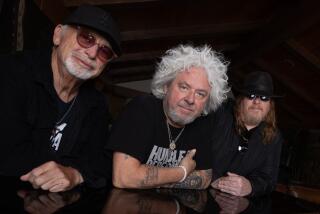Toots Doesn’t Mind Blowing His Own Horn : Reggae: ‘We are the real thing,’ says Frederick Hibbert, a leader in the Jamaican sound since the early 1960s. He performs tonight in San Diego.
- Share via
If one were to trace the development of modern Jamaican music from the primitive jump of ska through the formative years of rock-steady on to the fully realized era of reggae, it would be possible to monitor its evolution through the music of a single artist.
Frederick (Toots) Hibbert has been to the island’s music what James Brown has been to American R & B--an innovator, a trailblazer, a dynamic bundle of energy who has been at the forefront of an ever-developing sound for much of his career.
“The young kids call me ‘the roots,’ they call me ‘the teacher,’ they call me ‘the King,’ ” Hibbert said in a recent phone interview from a motel room in Florida. “They don’t have the willpower to create new music, so I’ll continue to teach them to sing total reggae.”
In 1993, Hibbert’s soul and gospel-charged brand of reggae is no longer at the cutting edge, but no one can deny him his due as a show-stealing vocalist, or as a progenitor of the music.
Hibbert, who performs tonight at Soma in San Diego and Sunday at Glam Slam in Los Angeles, grew up in a small town in the Jamaican countryside, singing hymns in the Baptist church and listening to American R & B on the radio. He moved to Kingston in 1962 and formed a group--along with singers Raleigh Gordon and Jerry Matthias--called the Vikings.
The following year, the trio had a pair of national hits with the ska tunes “Hallelujah” and “The Six and Seven Book of Moses.” The music was pounding, primal and raw, with a syncopated, up-tempo beat that sounded like American R & B rhythm turned inside out.
Hibbert, 47, remembers the era fondly.
“In those days, you’d just sing songs and be happy,” he said. “The songs come from God, and God gives us the best.”
The Vikings--which became the Maytals in 1966--continued to have hits in Jamaica throughout the ‘60s. As the decade progressed, island rhythm became less frenzied and began to take on a more spiritual cast. In 1968, the Maytals recorded “Do the Reggay,” coining the word that came to describe all syncopated Jamaican pop.
“The difference between ska and rock-steady is ska has a faster beat,” said Hibbert. “Rock-steady is an all-the-time-going beat, and it also carries a message about culture. But rock-steady and ska are also reggae. Put all of them together, and you still have reggae.”
In 1969, Toots and the Maytals recorded 3 1/2 minutes of intense, evangelistic reggae in “Pressure Drop,” a song that defines Hibbert’s unique style, and one that was included on the pivotal “The Harder They Come” movie soundtrack in 1975. The song owed as much to the frenetic soul belting of Otis Redding as it did the traditions of Jamaican music. Comparisons between Toots and Otis have characterized much of Hibbert’s press ever since.
“I don’t tell them to say that, but they found it in me,” he said. “Otis Redding was a great guy, but I don’t think (I sound like him). People compare me to James Brown, Ray Charles, Otis Redding, and I appreciate that they see these things in me. They see a power in me that they used to see in Otis Redding, so I just go along with it. They say what they want, but it’s just me. I touch a lot of different things when I’m singing.”
It was perhaps this link with stateside soul music that made Toots & the Maytals one of the most popular reggae groups with American audiences throughout the ‘70s.
His frenzied stage presence and feel-good proselytizing bore more than a passing resemblance to the gospel-influenced R & B legends Hibbert was so fond of, but his almost-religious stage fervor was born of Rastafari rather than Christianity.
“My songs are like a revival,” he said. “It will make you feel happy and revive you, make you feel good. It’s an inborn spirit, like Rasta. Rasta is a very spiritual name, but people abuse it. They don’t realize what they’re doing. Clean work, good music, openness--that’s what it takes to be Rasta.”
In 1982, Hibbert split with Gordon and Matthias to pursue a solo career, although he still calls his touring groups “Toots & the Maytals.” His most recent release was “Toots in Memphis” (1989) whereby Hibbert reaffirmed his connection with R & B by recording a batch of old soul numbers.
The album proved to be the end of his long relationship with Island Records. Although he’s unsigned for now, Hibbert said he’s working on a new album he hopes will be released before year’s end.
In the meantime, he has retained a loyal following--and Hibbert himself is something less than shy about blowing his own horn.
“We are the real thing, we play the real reggae.” he said. “The rap reggae and whatever is coming--they have to respect us, because we are the inventors of the music. Myself, Jimmy Cliff, Bob Marley, Bunny Wailer, we have the right touch, we are the roots, we are the originals. If they want to do it right, they have to copy us.”
* Toots & the Maytals, Pablo Brown, Wendy Shaw, and African Unity perform beginning at 8:30 tonight at Soma, 555 Union St., San Diego. $15. (619) 239-7662.
More to Read
The biggest entertainment stories
Get our big stories about Hollywood, film, television, music, arts, culture and more right in your inbox as soon as they publish.
You may occasionally receive promotional content from the Los Angeles Times.










